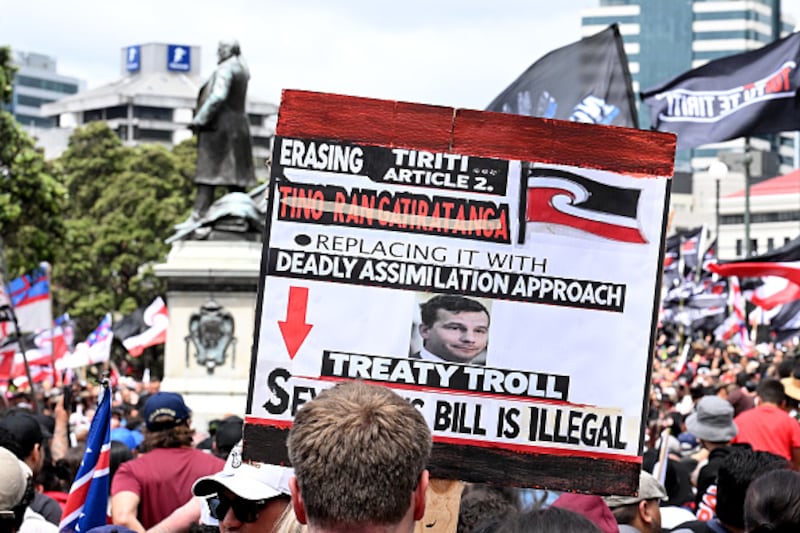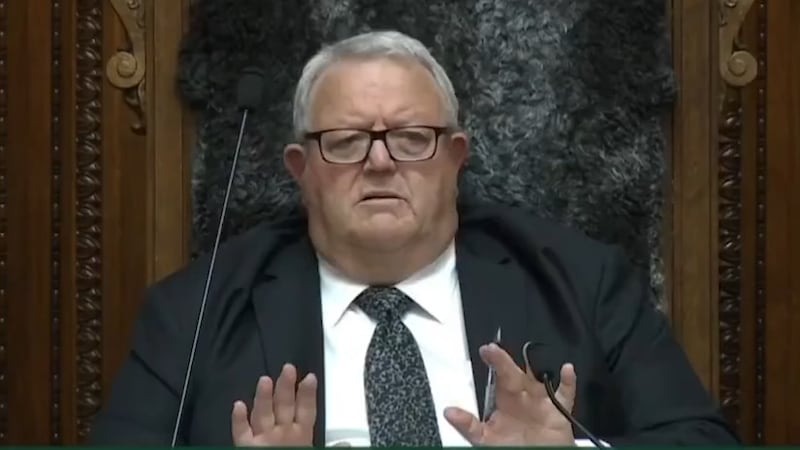From a Haka to the harshest punishment in Parliament – How did it get there? And when will it be over?
When Ka Mate reverberated inside the debating chamber, dubbed the Lion’s Den, te iwi Māori rose, and the world took notice.
The renowned haka, composed by Ngāti Toa Rangatira chief Te Rauparaha, was created approximately 200 years ago as he and his people escaped from some of their enemies and survived.
Though largely recognised globally through sport, one of our country’s youngest politicians, Te Pāti Māori’s Hana-Rāwhiti Maipi-Clarke, flung it back on the world stage to make a clear statement that the Treaty Principles Bill will die and te iwi Māori – and Te Tiriti - will live on.
The Treaty Principles Bill, which Act Party Leader and now Deputy Prime Minister, David Seymour, was the architect of, sought to provide a legislative framework for how the Treaty principles would be interpreted and applied, particularly in policy and operational decisions, legislation interpretation, and by the Waitangi Tribunal.

It faced vehement opposition across the country, which led to the historic and record-breaking hikoi to Parliament – tens of thousands taking to the streets to express their strong dissent of the bill.
Timeline
- November 14, 2024: Debates fire up in the Beehive as the Treaty Principles Bill first reading passes, but not before Te Pāti Māori MPs start a haka heard around the world. Maipi-Clarke was suspended for 24 hours after initiating the haka ‘Ka Mate’, with her pay also docked.
- November 21, 2024: Act Party lays a complaint against all MPs who participated in the “threatening” haka during the first reading of the Treaty Principles Bill.
- December 10, 2024: Debbie Ngarewa-Packer, Rawiri Waititi, Hana-Rāwhiti Maipi-Clarke, and Peeni Henare referred to the Privileges Committee for leaving seats during haka.
- March 26, 2025: Labour MP Peeni Henare apologises to the Privileges Committee for his part in the haka.
- April 23, 2025: Te Pāti Māori skip their hearing and instead opt for a written submission, refusing to apologise like Henare. Stating they were acting under the first law of Aotearoa — tikanga.
- May 20, 2025: Parliament delays the Privileges Committee report vote to June 5, freeing Te Pāti Māori MPs to attend Budget Day.
What is meant to happen today?
It could be the harshest punishment ever to be handed down to a New Zealand MP by the privileges committee – but before it is handed down, it must be presented to the house, debated and voted on whether to suspend the co-leaders, Ngarewa-Packer and Waititi, for three weeks, and whether Maipi-Clarke should face a further seven days of suspension.
She was already suspended for a day for her part in leading the haka.
How long that debate could last is unclear. The suspension debate is set to restart this afternoon, after initially being adjourned last month to allow Te Pāti Māori MPs to participate in the Budget Debate. However, Rawiri Waititi and Hana-Rawhiti-Clarke had already been scheduled not to be there on that day.
The suspension could mean they are unable to vote, let into the debating chamber, and are not paid.
The Speaker, Gerry Brownlee, told MPs last month that everyone will be able to speak on the matter, which could drag the debate out even further by filibustering – a term used to describe prolonged speeches to attempt to delay or obstruct passage of legislation.

While it’s not as dramatic as in some other countries (like the U.S. Senate), it is still a recognised political tactic in Aotearoa.
National Party Leader of the House Chris Bishop hopes for a swift end to the debate, though it’s unclear if the opposition will seek to extend it.
The coalition faces several pressing issues this week, including the resignation of one of the Prime Minister’s senior press secretaries, Michael Forbes, who has apologised after being accused of secretly recording sessions with sex workers and taking intrusive photos and videos of women.
If the debate goes on for more than 3 hours this afternoon, it could mean it would be adjourned and revisited after Parliament’s recess on the 24th June.
The last time an MP faced a suspension from the Privileges Committee was Sir Robert Muldoon in 1987. He was suspended for three days because he had criticised the then Speaker in a press release – until now, it is the harshest punishment an MP has faced.
The debate on the suspension is set to start this afternoon – keep updated with the latest on our website and social channels, where Te Ao Māori News will be streaming the suspension debate live.


